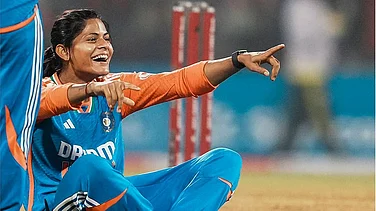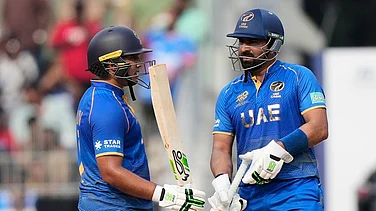It's official. Cricket - in the T20 format - has been confirmed to be a part of the 2028 Los Angeles Olympics programme, along with squash and three other sports. The announcement came during the 141st 141st IOC Session in Mumbai - the session coming to India after a 40-year gap. With this, cricket will return to the Olympics fold after 128 whole years, after featuring in the 1900 Paris Olympics. The confirmation of the much-awaited news comes as a big source of joy for fans in India and across the rest of the cricket-loving globe, who will get to see their favourite game at the most prestigious multi-sport event in the world. (Sports News)
The development follows cricket featuring at the 2022 Birmingham Commonwealth Games and the recently concluded Hangzhou Asian Games. The Indian women's team bagged silver at the CWG, and both the men and women struck gold at the Asiad, raising hopes of another glittering medal, come LA 2028. But beyond India's podium interests, the news has huge ramifications for the sport in general, which is set to get a global fillip.
The Games are estimated to have an audience of over three billion viewers across TV and digital platforms, which presents an opportunity for cricket to engage audiences in new geographies. Cricket itself boasts a global viewership of over one billion, spanning not just across the Test-playing nations but also in countries where the diaspora representing India and other sub-continental countries is significant.
Calling himself a "fan of T20 cricket", IOC president Thomas Bach had said in Mumbai last week: “What speaks in favour of the sport is that it has been gaining more and more international representation. With the T20, there is a format available that can be played in an Olympic Games. We see that interest in cricket is not only limited to countries where it is already played, but also to the USA, which has a growing Indian community, so you have a huge potential there.”
The inclusion of cricket will thus serve the dual purpose of cross-pollination of sporting audiences, and an opportunity for hitherto under-represented countries like Sri Lanka, Bangladesh and Pakistan to participate as equals at the Olympics and aspire to fetch an elusive medal too. There is also the likelihood of a mouthwatering India vs Pakistan clash at the biggest sporting stage of them all, which could be financially rewarding for all parties involved.
Mindful of what it could mean for the country, IOC member Nita Ambani said: “As an IOC member, a proud Indian, and an ardent cricket fan, I am delighted that IOC members have voted to include Cricket as an Olympic Sport in the LA Summer Olympics 2028.”
Like all other team sports at the 2028 Summer Olympics, cricket too will be played in a six-nation format. The host nation usually gets one spot by default, which leaves the other countries to fight for the remaining five berths. This could lead to intense competition in the qualifying stages, making that potentially exciting viewing by itself.
Though the Board Of Control for Cricket in India (BCCI) has historically been opposed to the induction of cricket in the Olympics, the board seems to have come around now with the Indian government as well as the International Cricket Council making a strong push for it. The prospect of making cricket the biggest sport on Earth is too tempting to pass, perhaps.
When it comes to being the most-followed and most-played sport on the planet, football currently has a sizeable lead, but with cricket broadening its horizons, there might just be some competition for the throne. Despite its all-pervasive presence, football has not been a success at the Olympics, with its criteria of (predominantly) Under-23 teams not attracting too many eyeballs.
In contrast, cricket has the opportunity of tapping new markets, in addition to a massive existing fan base in all parts of the world. If the format clicks and fits well with the Olympic programme, one can expect a windfall in revenue for all stakeholders.
At the same time, there are concerns like the suspension of play whenever it rains, making the proceedings farcical at times. Case in point being the Asian Games 2023 men's cricket final, which was awarded to India despite a no result. These logistical issues will need to ironed out, and sufficient reserve days will need to be allotted for cricket to be feasible in the long-term.
For now, though, it is time to rejoice for cricket enthusiasts.


























